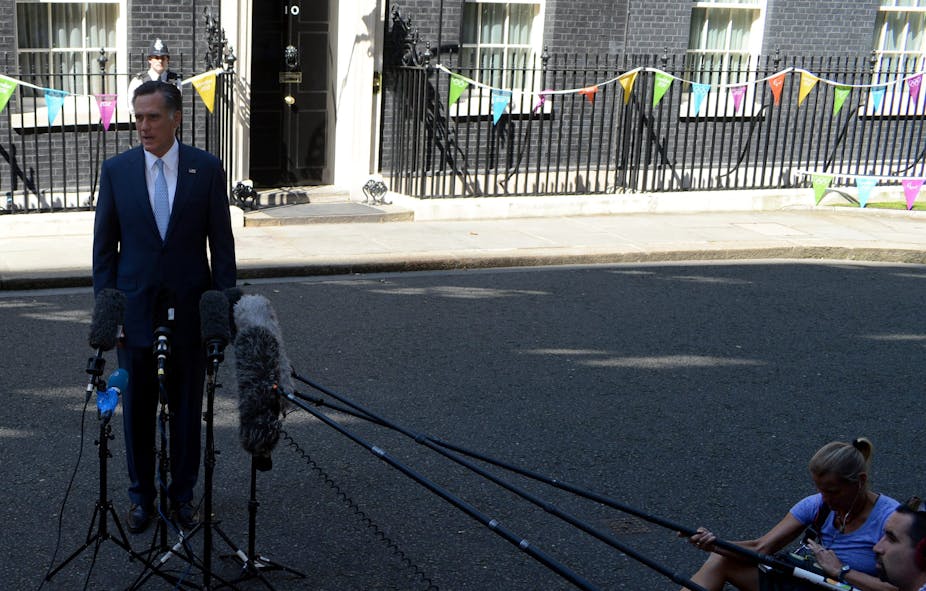There is less than a week to go in the US presidential race, and the candidates are coming agonisingly close in various battleground states. Imagining Mitt Romney in the White House might turn a few Democrat stomachs, but what of those outside the United States, notably in the European Union?
Given the lingering eurozone crisis, the question is playing on the minds of European leaders ahead of the November 6 elections. They have proven to be, at stages, puzzled by the vagueness of the GOP nominee. For one, none of his eight actions he proclaimed he would do within the first 100 days of being in the White House mention Europe, other than an ceremonial act of reassurance to “traditional allies”. Romney has promised to press NATO members to pour more money into the military kitty – 2% of GDP, to be exact. Otherwise, this election has been assiduously devoted to all matters domestic, wavering only at certain points, the attacks on the US consulate in Libya on September 11 being one such exception.
Attitudes to Romney from the European side have been mixed. If one is to believe Harvey Weinstein, British Prime Minister David Cameron would prefer an Obama administration any day. Romney’s stumbling tour of Britain during the London Olympics was nothing short of disastrous. It was intended to link his experience as a successful organiser of the Salt Lake City Winter Games in 2002 to his potential as a powerful business executive. Instead, his remarks about the security failings of the games led to conclusions that he was “Mitt the Twit”, a provincial, error-prone fool.
His visit to Gdansk and Warsaw had its photo moments, and again, were timed to drum up the Polish-American vote, which is not inconsiderable in such states as Pennsylvania and Ohio. That said, recent figures from the Pew Global Attitudes Survey place Obama’s popularity in Poland at 50%. Since the end of the Cold War, American presidents have been keen to highlight the role played by Poland in drawing back the Iron Curtain, eccentrically calling it part of “new” Europe. For his trouble, former Polish president Lech Walesa gave Romney his endorsement. Amongst his own party, Romney’s trip was considered an act of “borderline lunacy”, more so given that “not a single vote” would be cast on the subject.
Commentary of Romney’s world view from the European quarter has been negative. Der Spiegel has found his views “more reminiscent of 1982 than 2012”, bitten by a new Cold War freeze. Russia, in the Romney defense book, is the great foe, a theme he reiterated in his Virginia Military Institute address on October 8. In Europe, “Putin’s Russia casts a long shadow over young democracies”. Countries such as the Czech Republic were being abandoned by the Obama administration’s decision to adopt a “phrased adaptive approach to missile defense”.
Romney’s white paper on foreign policy is hardly more illuminating beyond the usual neo-conservative bromides: American exceptionalism, the need for robust US leadership, increased military spending. The words of Eliot Cohen, in his foreword to the paper, are typical. “The American choice is not, therefore, whether [the US] should lead: it is how to lead wisely,” Cohen wrote.
Clearly, the centre-right brains trust of the Republican Party, previously heavy with the presence of such luminaries as Henry Kissinger, Brent Scowcroft and Jeanne Kirkpatrick, is now threadbare in articulating a position on Europe.
Economically, where Romney has been hoping to make some strides against Obama, a trans-Atlantic vision of sorts has materialised. The mantra here is open markets, and the open market place is something the former Massachusetts Governor has reiterated with almost tedious certainty. While proving skimpy on security details with his European allies, apart from wanting them to pull more military weight, Romney has been pushing for a trans-Atlantic free trade agreement. On other points, Romney is proving exceedingly unhelpful, using the eurozone crisis as an example of what to avoid in the US. Fantasies of insulating the American market from European stagnation have been dished to the American electorate, a view at odds with the “open markets” credo to begin with. European welfare models are to be shunned – disaster lies that way.

Earlier in the year, at the New Hampshire primary debate, Romney lamented how “we are increasingly becoming like Europe. Europe is not working in Europe. It will never work here.” On CBS’s Face the Nation, he fobbed off suggestions of financial assistance to the ailing eurozone, suggesting that the US was “not going to send checks to Europe”. In Charlotte, North Carolina, Romney emphatically told his audience that Obama “is not going to remind anyone of Greece, because he has put us on the road to become more like Greece”.
Romney is on record as rejecting a more extensive US involvement in such organisations as the World Bank and the International Monetary Fund, suggesting how averse he is to the idea of financial rescue packages. There would be no “TARP-like program to try and save U.S. banks that have Italian debt, foreign banks doing business in the U.S. that have Italian debt, or European debt.”
It is fair to suggest that a Romney presidency, unless it becomes Romnesiac in shifting and forgetting its various positions, will be reluctant to open the US check book for a financially unstable Europe. Such a stance will be foolish, given the fact that the consequences of the free market often lead to the need, at some point, of government corrections.

